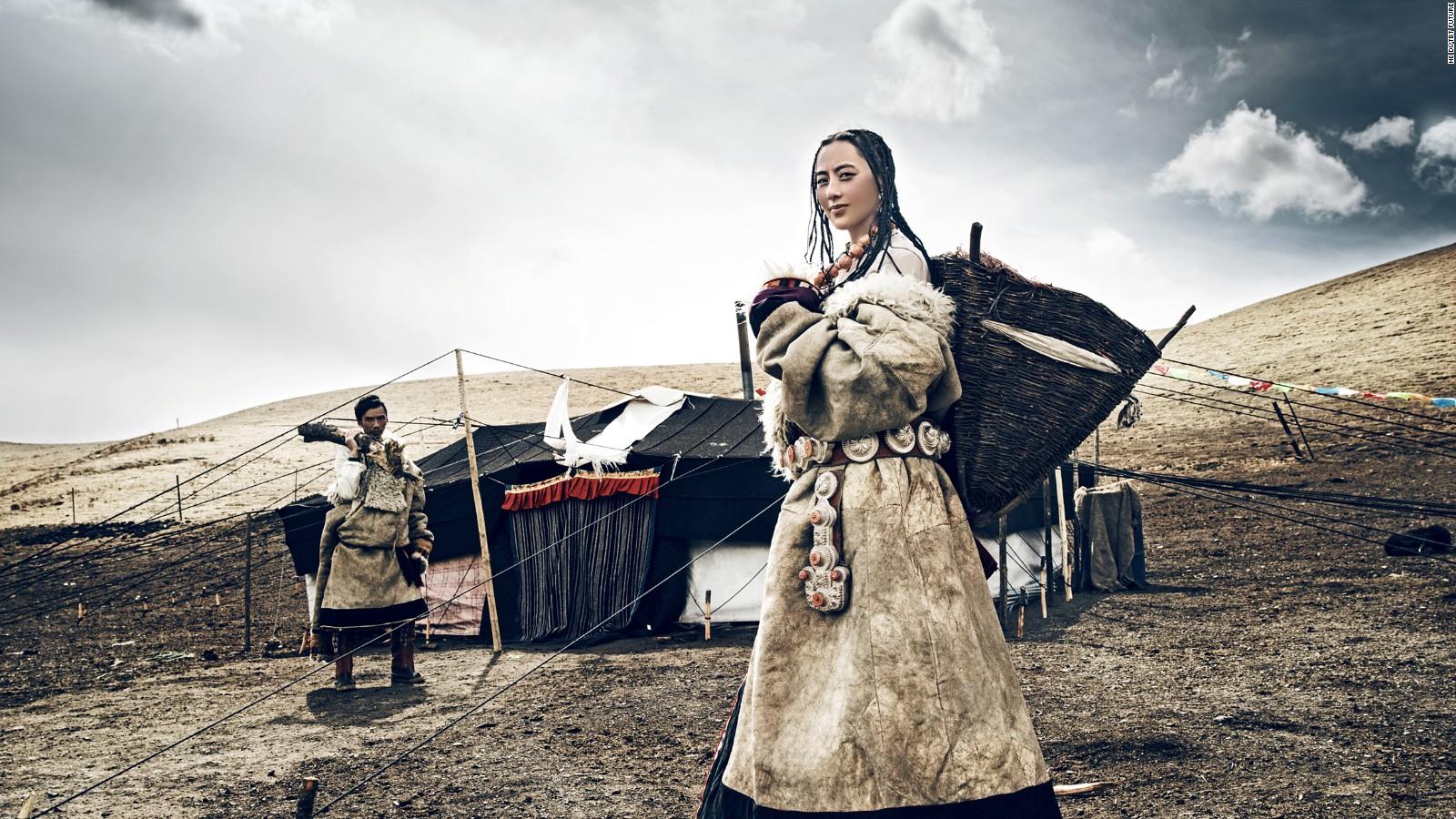Why a Tibetan couple’s wedding photos captivated the world
The couple, who married last year, pose with a Lamborghini in Chengdu, a major city in western China.
When a Tibetan couple tied the knot last year, they were not only newlyweds — they were newly famous.
Gerong Phuntsok, the co-founder of an ad agency, and his wife, Dawa Drolma, shared their engagement photos on social media before their wedding, and the collection immediately went viral.
The photos, so glamorous they could have been ripped from the pages of Vogue, caught the world’s attention because they defied common Chinese stereotypes portraying Tibetans as nomads or farmers from a bygone era. The couple was photographed in a Lamborghini, walking away from a helicopter, and strolling down an urban street. But the handsome pair was also pictured doing nomadic chores in the grasslands, wearing traditional Tibetan clothing and posing in front of the most sacred temple for Tibetans, the Jokhang, in Lhasa, the capital of the Tibet Autonomous Region. The photos are both proof of the emergence of a modern, urban Tibetan identity and an embrace of traditional Tibetan culture.
The pair had no idea their photos would be shared so widely — more than 500 million people across the globe saw them — but Phuntsok, 31, did intend for the photos to send a message, at least to his friends, who also feel the tension between their upbringings in rural Tibet and the expectations of living in Chinese cities.
“I want to start a discussion. We live in the modern city, we have a modern lifestyle,” Phuntsok said. “In the meantime, we lost something good.”
Tibetans who want to be on the cutting edge of their industry head to China’s most developed cities, which means moving into an environment dominated by ethnic Han Chinese, who account for 90 percent of China’s population. When Phuntsok and Drolma moved to Chengdu, a major city near Tibet, they had to adapt to a different culture, one that sometimes clashes with Tibetan values.
“In the city, to earn money and get what we want, we have to give up some of our integrity, some of our Tibetan religious convictions,” he said. “So everyone feels confused. We don’t know what to choose.”
Phuntsok says it hasn’t been easy reconciling his Tibetan culture, in which there are “many, many things more important that money” with the business world, where he says anything goes when it comes to making money.
His wife feels the same conflict.
Drolma, an academic who researches contemporary Tibetan society (no relation to the couple), also senses a conflict.
“Some Young Tibetans, when they move to cities, start to think their traditional culture is worthless and backwards. It doesn’t help them make money or improve their standard of living. So, some young Tibetans feel inferior.”

This is a feeling reinforced by mainstream China’s ideas about Tibet. While many Han Chinese prize some aspects of Tibetan culture, like its spirituality, music and and dance, Chinese stereotypes of Tibetans as primitive barbarians persist.
Take the experience of 57-year-old Ajaku, who grew up in dire poverty in a village near the town where Phuntsok was born. Ajaku, who along with her three daughters has turned her home in the mountains into a successful hostel for tourists, is illiterate and recalls how she was treated once in a store.
“I asked the price. The shopkeeper said, ‘don’t you have eyes, it’s written there.’ I said I’m illiterate. She said, ‘You Tibetans are so stupid.’ Then she told me my hands are dirty, don’t touch anything,” Ajaku said.
These entrenched attitudes are part of the reason why photos of Phuntsok and Drolma, sipping wine in a fancy restaurant in one photo and clutching Starbucks cups in another, drew so much attention. But the other photos, showing the couple picking kernels off corn cobs and posing outside by a tent, also struck a chord with people, especially with those who think that Tibetans in China who adapt to an urban lifestyle are selling out to the Han majority.
“If traditional culture is helpful to our lives, we should preserve it. If not, we don’t need to preserve it,” said professor Thubten Phuntsok (no relation to the groom), who is an internationally known scholar of Tibetan traditional medicine and history. “You know, primitive societies also had culture. But today nobody preserves their culture.”
The search for balance between old and new, tradition and modernity, respect and assimiliation, resonates with people all over the world. It's no wonder Phuntsok's and Drolma's wedding photos, a visual encapsulation of these tensions, turned half a billion heads.
